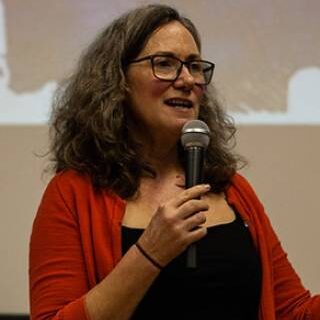
About Jennifer:
Jennifer Robinson has been a professor of Human Geography at University College London since 2009 and co-director of UCL’s Urban Laboratory since 2010. Previously she has worked at the Open University, the LSE, and the University of KwaZulu-Natal, Durban. She holds a PhD in Geography from the University of Cambridge and a BA and MA in Geography from the University of KwaZulu-Natal, Durban.
Her book, Ordinary Cities (Routledge, 2006) developed a post-colonial critique of urban studies. Her new book, Comparative Urbanism: Tactics for Global Urban Studies (Wiley-Blackwell, 2022), proposes new methodological foundations for urban studies which are further developed in the Routledge Handbook of Comparative Global Urban Studies, co-edited with Patrick Le Galès. Earlier empirical research explored the history of apartheid cities and the politics of post-apartheid city-visioning. Current empirical projects focus on the politics of large-scale urban developments (London, Johannesburg, Shanghai), funded by the ESRC, and the transnational circuits shaping African urbanisation (Accra, Dar es Salaam, Lilongwe), funded by the ERC.
Recent papers include: “Beyond variegation: the territorialisation of states, communities and developers in large-scale developments in Johannesburg, Shanghai and London”, with Fulong Wu, Phil Harrison, Zheng Wang, Alison Todes, Romain Dittgen, Katia Attuyer (2022) in Urban Studies, 59, 8; “Introduction: Generating concepts of ‘the urban’ through comparative practice” (2022), in Urban Studies, 59, 8 (Special Issue, J. Robinson (ed): Comparative methods for global urban studies); Robinson, J. and Attuyer, K. Extracting Value, London Style: States and Developers, (2021), in International Journal of Urban and Regional Research, 45, 2, 303-331; and “Comparative urbanism and global urban studies: theorising the urban”, in M. Lancione and C. McFarlane (eds). Global Urbanism: Knowledge, Power and the City (Routledge, 2021).
About keynote presentation:
Reflecting the “ordinary” through Ordinary Cities: geographies of conceptualisation in urban studies
How are questions of the “ordinary”, mundane and “everyday” related to wider efforts to transform urban studies? For ‘Ordinary Cities’ – an argument to sweep away inherited categorisations of the city, so they might all be considered ‘Ordinary’ and be treated as equivalent starting points for urban theorisations – the “ordinary” (from Jane Jacobs) was one basis for this rethinking. Bringing into view the diversity of urban life, the multiplicity of the connections assembling any city, and the fullness and complexity of the spaces we think of as urban, we could start again, to rebuild urban studies, starting from anywhere. As new understandings of the urban have proliferated, the value of thinking the urban from “ordinary” life in cities has indeed been emphasised. Emergent, embodied, lived experiences of the urban evoke the potential for alternative understandings that disrupt sometimes too-powerful narratives or ambitious and speculative urban futures, that tend to erase the ordinary. Ordinary, everyday, or mundane experiences are therefore seen as important starting points for alternative theorisations, as opportunities to create escape routes from universalising and authoritative accounts of the urban. There are, of course, also some challenges in this. The presentation will reflect on the potential that lies at this intersection of Ordinary Cities and the ordinary/everday/mundane.
Firstly, these terms and experiences are not isolated from the very formations of power and theory that they hope to oppose. The “everyday”, for example, emerges for Lefebvre with modernity – with the rhythms of capitalism, work and the extraction of “labour” from the fullness of life; the most general power relations, from capital to the state, are co-present in the “everyday”, in urban space. In this view of “everyday”, the transcalarity of urban life becomes evident, for example, in the politics of large-scale urban developments. Secondly, there has been a temptation to re-territorialise urban studies around these terms. Emergent, often ephemeral formations of “ordinary” urban life arguably constitute one of the most widespread forms of urbanisation across the planet, creating and remaking urban territories. This version of “ordinary” is also often used to ground a re-categorisation of global urban life, associated with “informality”, or located in a putative “global” South, or seen as inspiring a “Southern” theory. But it could be argued that these terms signpost the most fundamental elements of urbanity – its generative form, as assembling, as space, as socio-materialities constituting the fullness and complexity of urban life. Thus, in alliance with the project of Ordinary Cities, the “ordinary” could be seen to indicate ways of coming to know the urban, as emergent across its diversity, always exceeding our concepts of it. Finally, and linked to this, the “ordinary” or everyday appears often as indiscernible, and opaque, setting limits to the potential for thinking the urban in the face of a turning away from interpretation, a refusal to relate, or the brute materiality of urban life. But in leading us to this seeming interpretive abyss, the ordinary/everyday/mundane, could also be seen as opening to moments of maximum conceptual creativity, instigating new modes of conceptualisation as multiplicity.